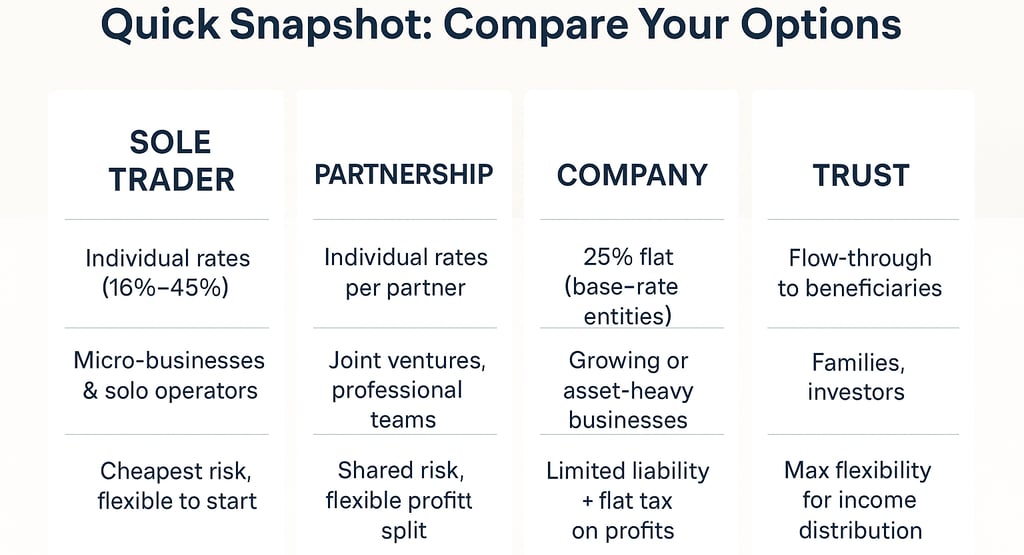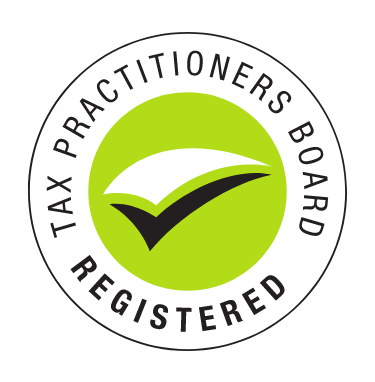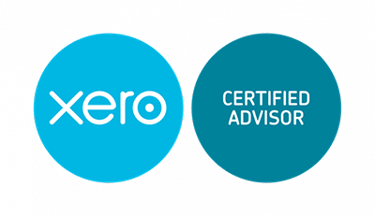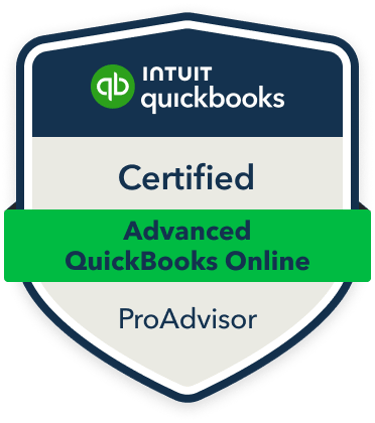Choosing the Right Business Structure in Australia
Learn how to choose the right business structure in Australia—Sole Trader, Partnership, Company, or Trust—to save tax and protect your assets.


Let’s keep this simple. Choosing the right structure for your business isn’t just a paperwork thing—it can mean saving thousands in tax, protecting your assets, and avoiding headaches later on. Here’s a practical, straight-talking guide to the four main structures used in Australia, including real-life examples from the clients I’ve worked with.
👤 1. Sole Trader: The Easy Start
What it is: You operate in your personal name, as the business.
Why people go for it:
Low cost, minimal admin
No separate business tax return required
Great for testing ideas or side hustles
What to watch out for:
You’re personally liable for everything (debts, lawsuits, etc.)
Ian’s take:
If you're under $100K revenue and just getting started, this is often the cleanest way to launch. I’ve seen many sole traders scale up from here once they have proof of concept.
👥 2. Partnership: Teaming Up
What it is: Two or more people running the business together, sharing profits and responsibilities.
Why it works:
Pooling of skills and capital
Simple tax treatment—each partner pays their own share
Downsides:
You’re jointly liable for what your partner does
Things can turn messy without a good agreement in place
Ian’s tip:
Always have a clear partnership agreement—especially if working with friends or family. I've seen partnerships fall apart just because they skipped that one step.
🏢 3. Company: Level Up Your Game
What it is: A separate legal entity that pays tax at 25% (if you’re a base rate entity).
Why people incorporate:
Protect personal assets (limited liability)
Retain profits in the company and pay a lower tax rate
Good for raising funds or dealing with investors
Downsides:
More red tape: ASIC, director duties, annual filings
Higher setup and professional costs
Ian’s tip:
Once your business is doing $150K+ and you’re reinvesting profits, it’s time to seriously consider moving to a company. You’ll often save a chunk on tax and look more credible to clients or banks.
🏠 4. Trust: For Families and Flexibility
What it is: A trust holds assets, and profits flow through to beneficiaries (often family members).
Why it’s useful:
You can distribute income to whoever pays the least tax
Useful for family-run businesses or long-term investment planning
What to watch:
Admin is fiddly—annual resolutions, distribution minutes
Mistakes can lead to big penalties
Ian’s tip:
Family trusts are powerful when used properly, but you need advice to run them right. I’ve helped clients save tens of thousands a year by setting up a trust/company combo the right way.
🔍 Your “Pick-and-Mix” Decision Roadmap
Step Action.
Check where you are: What’s your current tax rate? What assets are at risk?
Compare structures: Model out tax and liability differences with your accountant.
Filter by compliance: Understand reporting, GST, director duties, etc.
Set it up properly: Register the entity, transfer assets, update TFNs, ABNs, GST.
Review every year: Businesses evolve—so should your structure
💬 Real Examples From the Field
Jessica the Solopreneur
Kept her setup as a sole trader under $80K—saved time, stayed lean, and reinvested everything back into marketing and systems.
The Carter Brothers
When their partnership hit $300K in revenue, they moved to a company. With reinvested profits now taxed at 25%, they’re growing faster—and sleeping easier.
Nguyen Family Clinic
We helped them build a company + family trust setup. They now distribute income among four adult family members, saving more than $20K in tax each year.
🧾 Final Thoughts
There’s no one-size-fits-all. It’s about choosing the structure that suits your income, risk, and future plans.
Just testing the waters? Start simple as a sole trader.
Teaming up? Partnership can work—but get it in writing.
Growing fast? A company keeps things efficient and credible.
Running with family or investing? Trusts open more strategic doors.
The right choice upfront can save you thousands down the track—and help you grow with less stress. Don’t guess—talk to someone who’s done it before.
Disclaimer: This is general info only. Always get professional advice tailored to your specific situation.
Connect
Your trusted partner in Australian accounting services.
Empower Your Financial Decisions
© 2025. PROSPERITY ACCOUNTING & CONSULTING | Liability limited by a scheme approved under Professional Standards Legislation.
Accreditations & Partners












